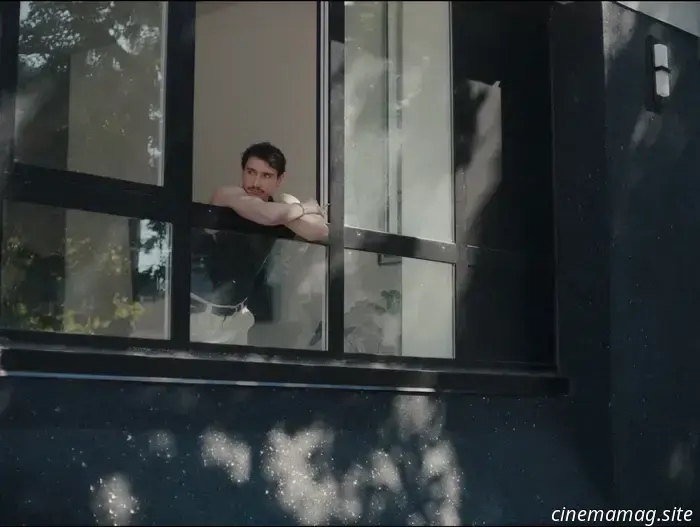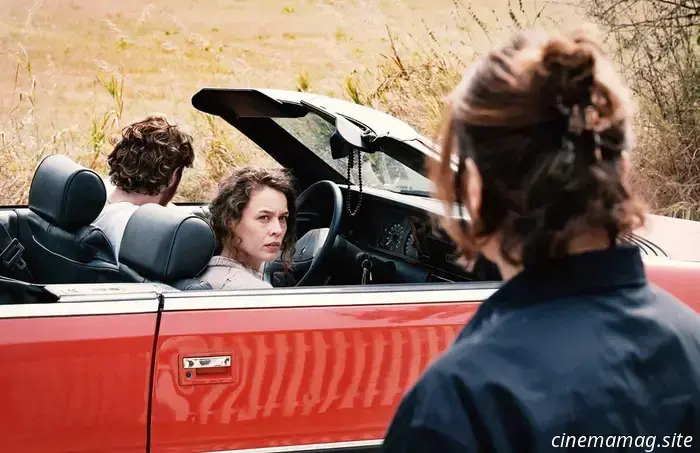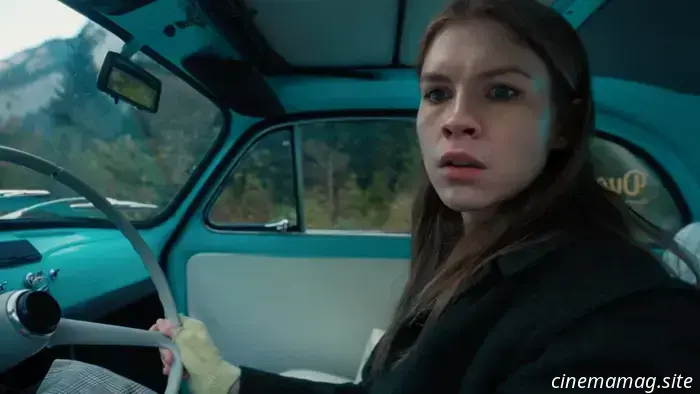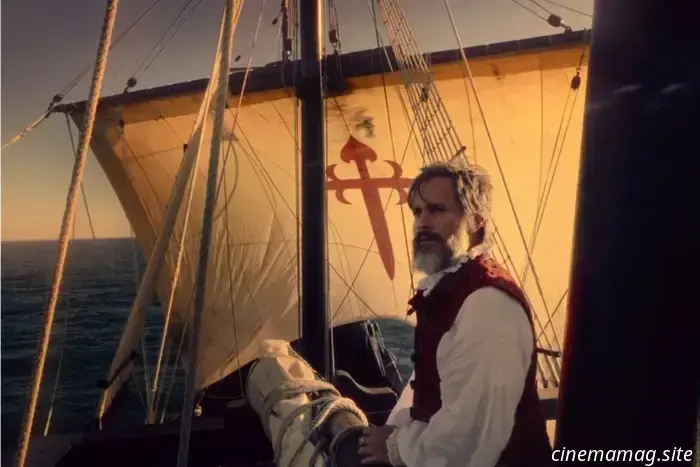
Cannes Review: Drunken Noodles is an Alluring and Uniquely Soothing Drama
The laws governing time and space are playfully challenged in Drunken Noodles, Lucio Castro's eagerly awaited third feature and undoubtedly the most talked-about entry in this year’s ACID lineup. Those familiar with the New York-based, Argentinian-born director likely first discovered him through End of the Century, a film that similarly disregards conventional timelines: set in Barcelona, it portrayed two men who appeared to fall in love only to discover it was not their initial meeting. Upon its 2019 release, critics were split regarding some of the film’s more daring elements––perceived as overreaching. There are a few moments in Noodles that evoke a similar feeling, but overall, it is a sultry and oddly soothing film, offering 82 minutes of late-night encounters and lingering ennui that flows like a summer breeze.
Laith Khalifeh, a newcomer, plays Adnan, an art student and recent transplant to New York. His agenda includes interning at an art gallery for the summer, taking care of his uncle’s expansive Brooklyn apartment, and socializing at McCarren Park. Castro divides the narrative among three of Adnan’s romantic interests: first, a delivery driver, Yariel (Joel Isaac), in what appears to be the present; then a flashback to a meeting with a reclusive artist, Sal (Ezriel Kornel), whose work is featured at Adnan’s internship; and finally, a retreat with a past lover, Iggie (Matthew Risch), in a tranquil woodland escape upstate. Castro depicts the encounter with Sal as the emotional heart of Drunken Noodles and a key memory for Adnan: a significant sexual experience with an older man that not only brings him to New York but also seemingly fulfills a childhood dream. Castro harnesses this theme of interconnectedness to craft a narrative Möbius strip.
The director notes that Kornel’s character draws inspiration from Sal Salandra, a septuagenarian embroiderer renowned for his whimsical and colorful portrayals of queer orgies and hookup culture––a surreal and celebratory aesthetic that the film embraces as a central idea. Some of Salandra’s work is showcased in the early part of the film, and Castro includes a brief yet insightful critique provided by Yariel to his fellow delivery drivers in a scene that may come off as slightly condescending. The group later gathers at Adnan’s for an orgy, which Castro captures in some beautifully frozen images, reminiscent of artistic recreations seen in João Pedro Rodrigues’s Will-o’-the-Wisp. Castro further indulges in experimentation during the next segment, where Adnan and Sal encounter a lustful Mr. Tumnus in the woods, who proceeds to pleasure himself with a ruby slipper and a flute. If that seems excessive, it is, serving as a fanciful diversion that briefly disrupts the film’s otherwise cohesive spell.
This shouldn't undermine the stunning way the scene (and most of the film) is visually rendered. Before viewing, I was intrigued to learn that cinematographer Barton Cortright, known for his hypnotic sterility in films like Ricky D’Ambrose’s The Cathedral and Joanna Arnow’s The Feeling That the Time for Doing Something Has Passed, was behind the lens. Cortright takes a different approach in Drunken Noodles, luxuriating in sultry shadows and natural light in a somewhat less innovative yet undeniably beautiful manner throughout. The music, a synth-infused soundscape created by Castro’s frequent collaborator Roberto Lombardo, perfectly matches the languidness and humidity of New York’s late-summer nights. Castro concludes with an enigmatic finale, though it doesn’t linger too long in one’s thoughts. This is a film meant for relaxation.
Drunken Noodles made its debut at the 2025 Cannes Film Festival.
Other articles
 Cannes Review: Christian Petzold’s Mirrors No. 3 is a Mysterious Drama About Release and Acceptance
Christian Petzold’s fifteenth feature, Mirrors No. 3, is his fourth collaboration with Paula Beer, the actress who first appeared under his direction in Transit (2018). This film also explores key themes similar to those in his latest work, particularly the concept of complete strangers intuitively recognizing one another and experiencing an instant, profound connection without saying a single word. It goes without saying that Mirrors No. 3...
Cannes Review: Christian Petzold’s Mirrors No. 3 is a Mysterious Drama About Release and Acceptance
Christian Petzold’s fifteenth feature, Mirrors No. 3, is his fourth collaboration with Paula Beer, the actress who first appeared under his direction in Transit (2018). This film also explores key themes similar to those in his latest work, particularly the concept of complete strangers intuitively recognizing one another and experiencing an instant, profound connection without saying a single word. It goes without saying that Mirrors No. 3...
-4K-Ultra-HD-Review.jpg) Starman (1984) - Review in 4K Ultra HD
Starman, 1984. Directed by John Carpenter. Featuring Jeff Bridges, Karen Allen, Charles Martin Smith, and Richard Jaeckel. SYNOPSIS: Previously available exclusively in the Columbia Classics: Volume 4 collection, the 4K Ultra HD edition of John Carpenter’s Starman is now released as an individual Steelbook edition. The set does not include the two discs that contain the single-season TV series, […]
Starman (1984) - Review in 4K Ultra HD
Starman, 1984. Directed by John Carpenter. Featuring Jeff Bridges, Karen Allen, Charles Martin Smith, and Richard Jaeckel. SYNOPSIS: Previously available exclusively in the Columbia Classics: Volume 4 collection, the 4K Ultra HD edition of John Carpenter’s Starman is now released as an individual Steelbook edition. The set does not include the two discs that contain the single-season TV series, […]
 How Freddy MacDonald Made His Feature Debut at 24 with Sew Torn
Some fathers show their sons how to catch a ball or tie a tie, and we are confident that Sew Torn director Freddy MacDonald learned those skills from his dad as well. However, he also
How Freddy MacDonald Made His Feature Debut at 24 with Sew Torn
Some fathers show their sons how to catch a ball or tie a tie, and we are confident that Sew Torn director Freddy MacDonald learned those skills from his dad as well. However, he also
 Cannes Review: Lav Diaz's Magellan is a Captivating, Clear Examination of the Atrocities of Colonization.
Ferdinand Magellan has not typically been seen as a significant figure in history, and Lav Diaz’s unexpectedly traditional––though still captivatingly slow––biopic employs a genre framework to further disavow his legacy. Originating from a long-planned project centered on Magellan’s wife Beatriz, the film now serves as an unconventional companion of sorts: it is a piece that you could never confuse for
Cannes Review: Lav Diaz's Magellan is a Captivating, Clear Examination of the Atrocities of Colonization.
Ferdinand Magellan has not typically been seen as a significant figure in history, and Lav Diaz’s unexpectedly traditional––though still captivatingly slow––biopic employs a genre framework to further disavow his legacy. Originating from a long-planned project centered on Magellan’s wife Beatriz, the film now serves as an unconventional companion of sorts: it is a piece that you could never confuse for
-sixth-scale-figure-revealed.jpg) Hot Toys has unveiled the sixth scale figure of the Airborne Trooper from the 212th Attack Battalion in Star Wars: Revenge of the Sith.
Hot Toys continues to commemorate the 20th anniversary of Star Wars: Episode III – Revenge of the Sith with the unveiling of the sixth scale collectible figure of the Airborne Trooper (212th Attack Battalion); take a look here… SEE ALSO: Embrace the Dark Side with Hot Toys’ Star Wars: Revenge of the Sith Palpatine […]
Hot Toys has unveiled the sixth scale figure of the Airborne Trooper from the 212th Attack Battalion in Star Wars: Revenge of the Sith.
Hot Toys continues to commemorate the 20th anniversary of Star Wars: Episode III – Revenge of the Sith with the unveiling of the sixth scale collectible figure of the Airborne Trooper (212th Attack Battalion); take a look here… SEE ALSO: Embrace the Dark Side with Hot Toys’ Star Wars: Revenge of the Sith Palpatine […]
 Superman Unlimited #1 - Comic Book Sneak Peek
DC Comics is set to debut its new ongoing series, Superman Unlimited, this Wednesday. You can view the official preview of the inaugural issue below. The summer of Superman intensifies with this fresh ongoing series that’s making waves in the DC Universe! As an asteroid the size of Metropolis approaches Earth, the […]
Superman Unlimited #1 - Comic Book Sneak Peek
DC Comics is set to debut its new ongoing series, Superman Unlimited, this Wednesday. You can view the official preview of the inaugural issue below. The summer of Superman intensifies with this fresh ongoing series that’s making waves in the DC Universe! As an asteroid the size of Metropolis approaches Earth, the […]
Cannes Review: Drunken Noodles is an Alluring and Uniquely Soothing Drama
The laws of time and space are playfully challenged in Drunken Noodles, Lucio Castro’s highly anticipated third feature and undoubtedly the standout title in this year’s ACID lineup. Many who are familiar with the New York-based, Argentinian-born director first came across his work through End of the Century, a film that shares a similar approach to time: set in Barcelona,
